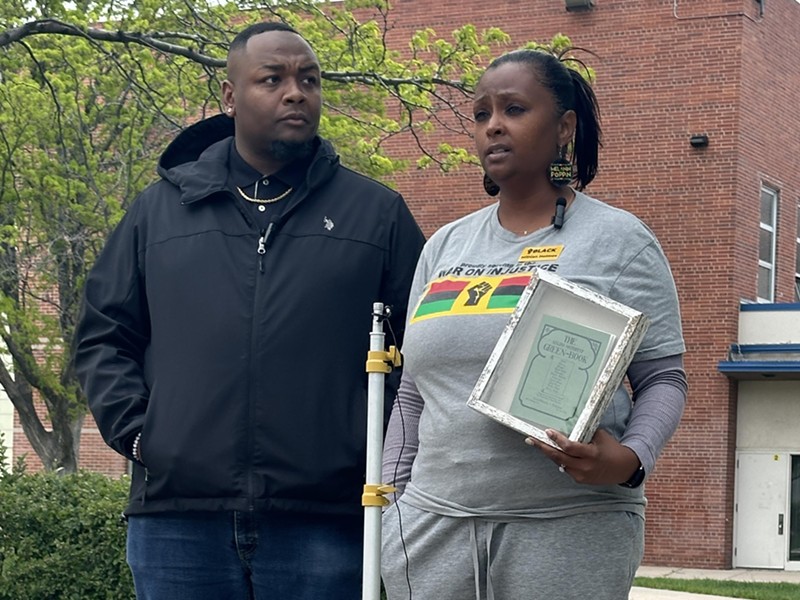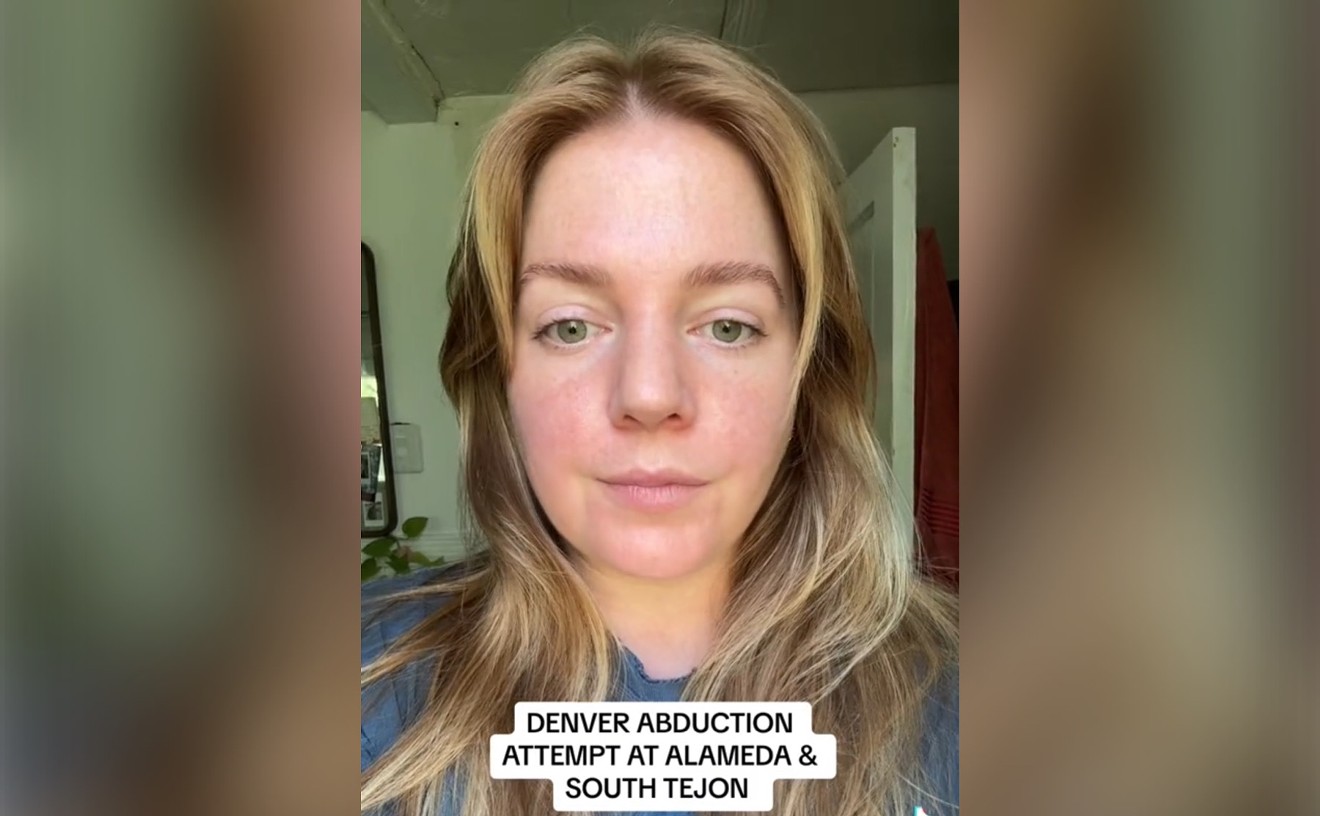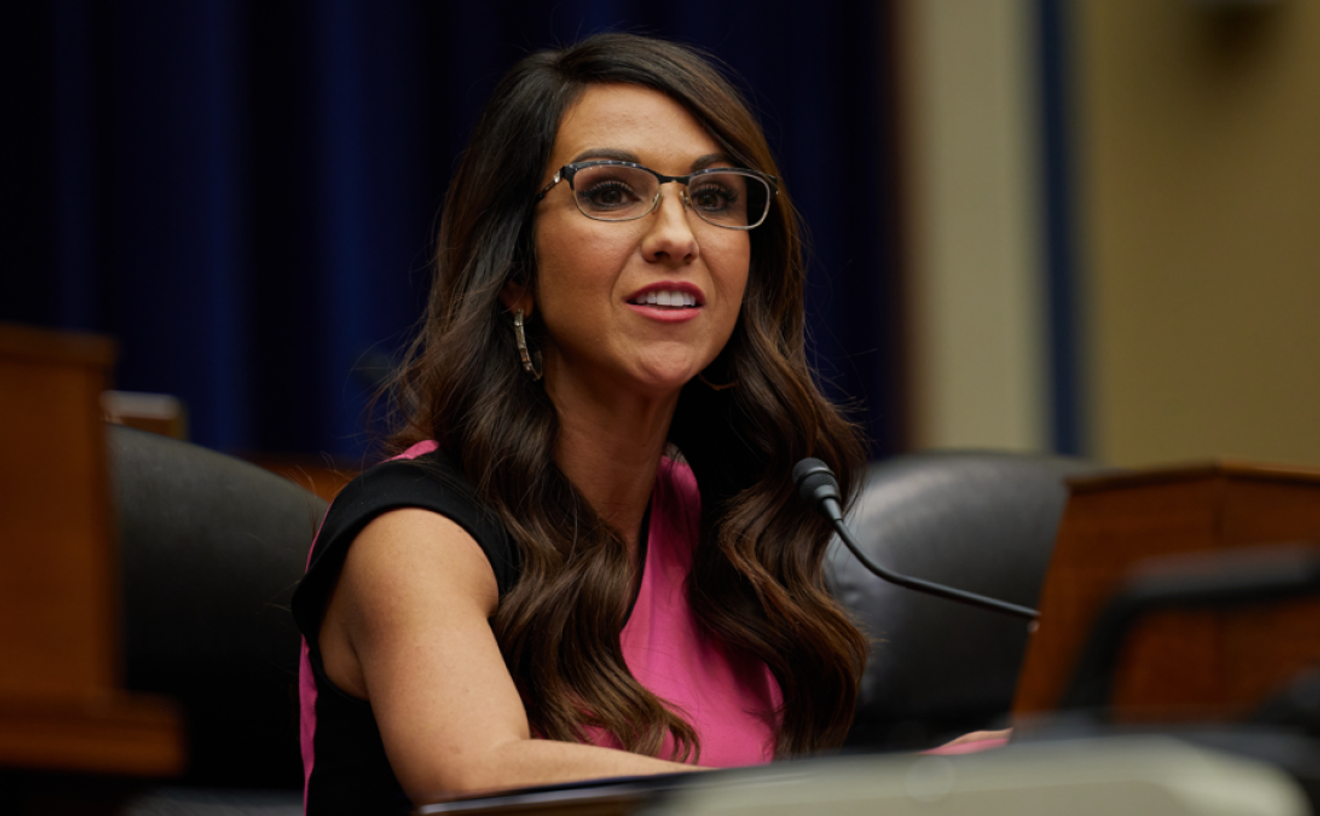Less than two weeks into its existence, the program has already sparked controversy in at least one school district, Englewood Schools, after its board received the lowest score possible in the Green Book Initiative's first round of evaluations due to "perceived deficiencies in supporting the Black community with humanity and dignity."
The results were read aloud at an Englewood Schools Board of Education meeting on May 7.
Auon’tai Anderson, CEO of the Center for Advancing Black Excellence in Education and former Denver School Board vice president, and MiDian Holmes, CEO of the Epitome of Black Excellence & Partnership, are behind the Green Book Initiative's launch; they presented their findings to the board during the May 7 meeting.
Anderson and Holmes said their organizations would instruct Black families to send their kids elsewhere until changes are made by Englewood Schools and the board to improve its Green Book rating.
"We are looking forward to supporting you to get out of that status and to change directions, because we know that this district cannot sustain more students leaving, because it will lead to larger budgetary impacts," Anderson told the board.
At the end of the meeting, boardmembers voted unanimously to change their public comment policy to bar people without direct ties to the district — such as Anderson and Holmes — from speaking during public comment sessions without an invitation from the board president or superintendent. More specifically, only residents, property owners, parents, students and staff are allowed to sign up for comment now.
In response, a coalition of Black leaders and advocates — including Brother Jeff Fard and his Cultural Center, Dr. Ryan Ross with the Urban Leadership Foundation of Colorado, and former Aurora Public Schools Board of Education member Dr. Eric Nelson — across the state spoke out against Englewood Schools and the board in a joint statement sent to district officials after the May 7 vote.
"We issue this statement to unequivocally denounce the Englewood School Board's disgraceful decision to restrict public comment to those with direct ties to the district," the group said in a statement.
"This action constitutes a targeted and deliberate attempt to suppress the voices of Black-led organizations and other community advocates who have sought to hold the board accountable for its failures. The newly adopted policy...explicitly shuts out the broader Black community. It is a direct attack on accountability and transparency, designed to silence dissent and insulate the board from external scrutiny following their poor rating in the Green Book Initiative. This is nothing short of a racially motivated decision rooted in cowardice and blatant disregard for the opinions of those they do not wish to hear."
Anderson and others called for a boycott of Englewood Schools, saying Black families had started pulling out of the district because of its new Green Book rating.
"Since our last appearance at your school board meeting in April, we have engaged 88 families, and 83 of those families we spoke with have elected not to enroll or re-enroll in Englewood Schools district this fall," Anderson said.
Speaking out for the first time about the Green Book Initiative findings and Englewood controversy, Anderson tells Westword he's "hopeful" the results can ignite change within Englewood Schools and other districts.
"We're trying to ensure that this isn't a repetitive cycle," he says.
So far, the Englewood School Board is the only entity that's been given "Exodus status," the lowest possible score. Several schools and districts are currently under review, including the Cherry Creek School District Board of Education and Eaglecrest High School, Windsor Middle School and Weld RE-4, and Edna and John W. Mosley P-8.
One of the biggest issues that Anderson, Holmes and the Green Book Initiative point to regarding Englewood Schools is its alleged mistreatment of its only Black boardmember, Davon Williams, who was denied a $140 mileage reimbursement in March.
"From a school board perspective, we really went into identifying, 'Is your school board truly offering and affording the same type of leadership opportunities, the same type of resource accesses, that their white counterparts or that their non-Black counterparts are experiencing?'" Holmes tells Westword. "For example, if someone is going to a conference and they're looking for mileage reimbursement and their white counterparts get that with no question, but they actually are expressing need for mileage reimbursement and that's met with almost an anonymous vote of, 'We're not going to give it to you,' there is obviously a discrepancy."
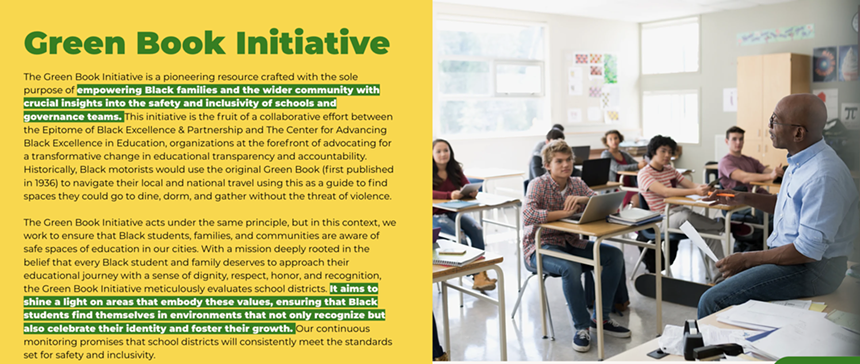
The Green Book Initiative is aimed at both celebrating and criticizing schools for the treatment of Black students and educators.
Center for Advancing Black Excellence in Education
Holmes and Anderson say the Englewood school board's vote to suppress public comment is a backhanded way of keeping people from speaking out about the Williams situation and other areas of concern. They recognize that Williams — a convicted felon who made headlines late last year for being involved in a car theft case — has had some serious personal issues, but that shouldn't lead to him being treated differently than his peers in board-related matters, such as mileage reimbursement.
"We have watched from afar, and have watched this individual — who is not perfect, he's had his own struggles — but we've watched the treatment of this Black school board member being different than that of his white counterparts, and we are very concerned about the ongoing treatment of this individual, who has been duly elected and consistently has to face several aggressions from his colleagues," Anderson says.
Williams was elected to the Englewood School Board in November after running unopposed.
The school district insists that changing public comment rules was not to silence outsiders from speaking out at board meetings about Williams's alleged treatment and other issues, but to update policy to reflect what other districts and schools have been doing. Officials note how Williams, who did not respond to requests by Westword for comment, voted to pass the change.
"Many other districts have similar language in their policy that encourages ensuring that there's a nexus to the district when folks are coming in and engaging in public comments," says Englewood Superintendent Joanna Polzin. "That is why it was a 5-0 unanimous vote regarding the updated language in the policy."
Polzin adds, "We are open to external voices. We just want to ensure that with regard to that, it is an external voice that's going to co-create positive change for our students and our community."
The superintendent says the district reviewed several other board policies and consulted with the Colorado Association of School Boards before updating its own policy language.
According to Polzin, the Cherry Creek School District has similar language, and there are districts and schools "up north" with similar policies as well. "We've updated over eighty policies this year," she says of Englewood. "This was one that was in the queue."
As far as the Englewood school board's Exodus Rating goes, Polzin says Englewood Schools understands where the Green Book Initiative and groups involved are coming from, but the district disagrees with their findings. The school board received a 1.8 rating out of 5.
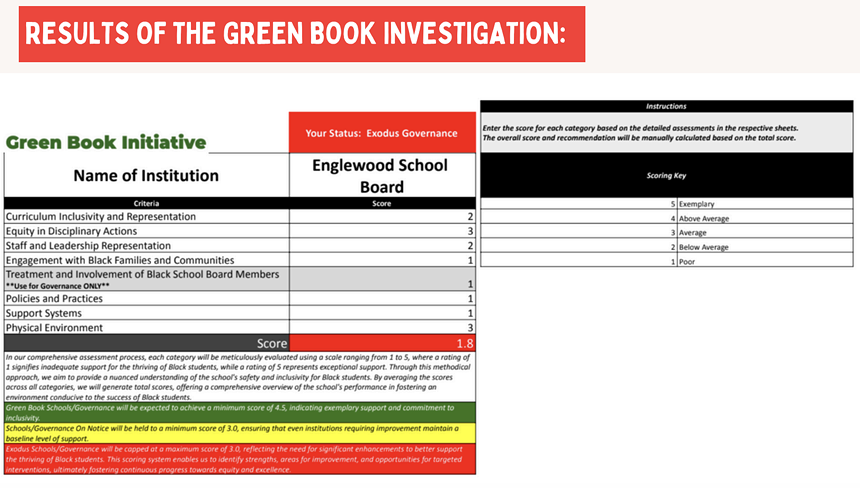
The Green Book Initiative says it uses a "robust rubric" and scoring scale of 1-5 when evaluating schools, but Englewood educators don't agree with the method.
Center for Advancing Black Excellence in Education
"When it comes to the Green Book Initiative, the grounding concept of improving outcomes for our Black students that's underscored in the Green Book Initiative, that is absolutely a critical issue to address in education," says Dr. Rana Razzaque, director of Opportunity, Access and Inclusion for Englewood Schools.
"We know that there's a lot of systemic barriers, particularly for our Black students, so I wholeheartedly agree with the concept of lifting up our Black students," she adds. "And at the same time, the score that's associated with the rubric is unsound, according to current research."
Specifically, Razzaque notes how there's "no mention of student empowerment and experiences" in schools being rated by the Green Book Initiative, which she says is a "key research-based indicator of equity and belonging" in one's educational environment. There's also "no justification or evidence linked with the scores that are assigned to each category," according to Razzaque.
"Not only does that make my team and I question how the scores were assigned, it inhibits the ability to use the scorecard constructively in order to improve," she says.
The Green Book scoring system has three ratings: Exodus, On Notice and Green Book Schools (the highest).
It uses a "robust rubric" to "comprehensively evaluate the safety and inclusivity of school environments for Black students, addressing their unique needs and elevating their excellence to foster an environment where all students feel valued, respected, and empowered to excel," according to the online description.
Educators should be committed to "equitable teaching practices," and the districts must offer "strong support systems for Black students," including mentorship programs, resources for academic and emotional support, and platforms for students and families to voice needs and concerns, the initiative adds.
Green Book Districts are described as having policies and practices that are designed to not only avoid discrimination but actively promote "cultural understanding, respect for diversity and the celebration of Black history and achievements." The curriculum must be inclusive and reflect the "contributions and experiences" of Black individuals and communities, according to the online description.
Anderson says that recognizing schools with Green Book status is just as important as recognizing ones with Exodus status. Schools that have earned Green Book status include Manual High School, Whittier ECE-8 School, Wyatt Academy Charter School and the Harrison School District Two, Board of Education.
"We want to celebrate them," Anderson says. "This isn't going to be a critical tool that's only used to punish. We're celebrating three schools and a school board that we believe have met the criteria of being a Green Book School and in a Green Book governance model for folks to look to and say, 'What is Manual High School doing so well that they have earned this distinction? What is Wyatt Academy doing? What is the Harrison School Board doing?'"
One of the biggest reasons for launching the Green Book Initiative, Anderson says, was to give families and educators a "road map" for evaluating what's best for Black students outside of test scores and graduation rates.
"When you look at [a School Performance Framework] rating for a school, there's nothing that tells you how Black students and educators are actually treated in those individual schools. It only tells you the state test results of that school," Anderson says. "And so we want to peel back beyond test scores. We want to really focus on the treatment and the experience that both Black educators and students are having in these areas."
Holmes tells Westword that curriculum at a school or school district plays a huge role in how schools are perceived through the Green Book Initiative.
"If the curriculum is designed to only offer one narrative without actual cultural consciousness and there being identified ways in which the curriculum allows for opposing narratives or for additional, multifaceted narratives to come into that space, then therein lies the opportunity for that psychological trauma to start to happen," Holmes explains.
"We have to make sure that our curriculum is designed to allow for all of our students — Black students, in particular — to have a space that they're able to actually interrogate some of the curriculum that's being presented to them," he continues, "that it's not through the lens of their lived experience, that it's not parallel to the history that they've been taught."
Polzin and Razzaque agree that shaping curriculum around a school's students is vital to creating the nurturing environment that the Green Book Initiative is looking for, and they say it's something they've been doing in Englewood schools.
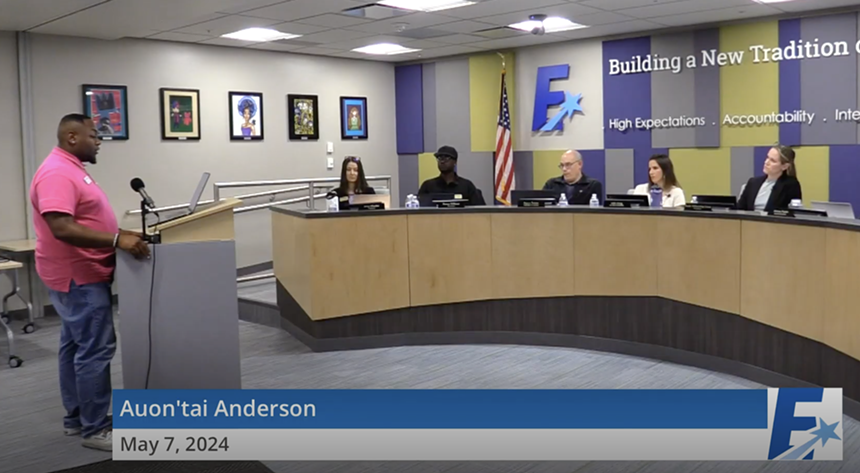
Auon'tai Anderson presented the Green Book Initiative to the Englewood school board during a meeting on May 7. The board has since changed its public comment rules.
Englewood School Board
Out of the nearly 2,400 students enrolled in Englewood Schools during the 2023-2024 school year, 4.8 percent identify as Black, according to the Department of Education. A little over 42 percent identify as Hispanic; 46 percent identify as white; 5.4 percent identify as two or more races; less than 1 percent identify as Asian; and less than 1 percent identify as American Indian or Alaska Native.
Razzaque says student feedback has been a catalyst for change in Englewood Schools curriculum and other areas in need of improvement.
"I've done listening sessions with historically marginalized student groups," Razzaque says. "Student feedback has helped directly shape a lot of our programming, our curriculum choices, tool kits — like our gender-inclusion tool kit — as well as other district resources and support."
The feedback, according to Razzaque, comes largely from listening sessions with perspectives from racially marginalized students, linguistically marginalized students, and students who are involved in Gender Sexuality Alliances.
"Hosting these listening sessions has been an incredibly powerful way for me to just garner information about student experiences at their school," she says. "I've conducted student workshops, student voice groups...and when I do that, I really look at diversity and student perspective."
Asked if there are areas in which Englewood Schools could improve, as pointed out by the Green Book Initiative, Razzaque and Polzin admit that there are — but they believe these problems should be addressed internally, not by "outside" forces who aren't basing their assessments on "current research."
"There are certainly spaces where we can improve," Razzaque says, pointing specifically to how the district deals and communicates with student families, its expansion of student voice efforts and areas related to equity.
"Equity is both the process and the product," she concludes. "It's not any sort of destination point that we reach, but rather this ability to continue to improve in all facets of better serving our diverse community. As a school district that's committed to educational equity, our responsibility to our students, staff and families is to ensure that we are providing high-quality, research-based support. That means that we stay the course with our work in serving our students even when outside organizations may be trying to distract us from putting students first."
Regardless of what schools and districts think, Anderson and Holmes plan to take the Green Book Initiative across the country in the coming years, with the hopes of rolling it out in areas and states where Black students, educators and boardmembers are historically marginalized — like the South, where the original Green Book was widely used and revered as the "bible of Black travel" during Jim Crow.
"We have contacts with school districts across the country that we've explained this initiative to, and they are interested in this tool, because they are understanding that they may not be able to say — as a school board or as a school board member or as an educator — that their school is unsafe for Black children," Anderson says. "But our organizations can say those things. And so we look forward to challenging those in southern states who are on a constant attack of Black excellence. We look forward to challenging them and showing them what we can accomplish and giving road maps to families in those areas."

